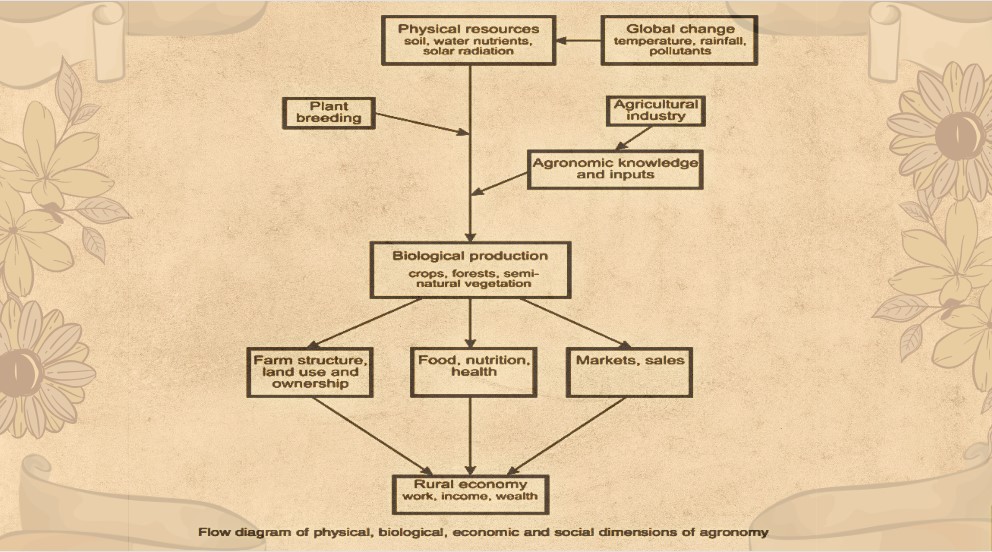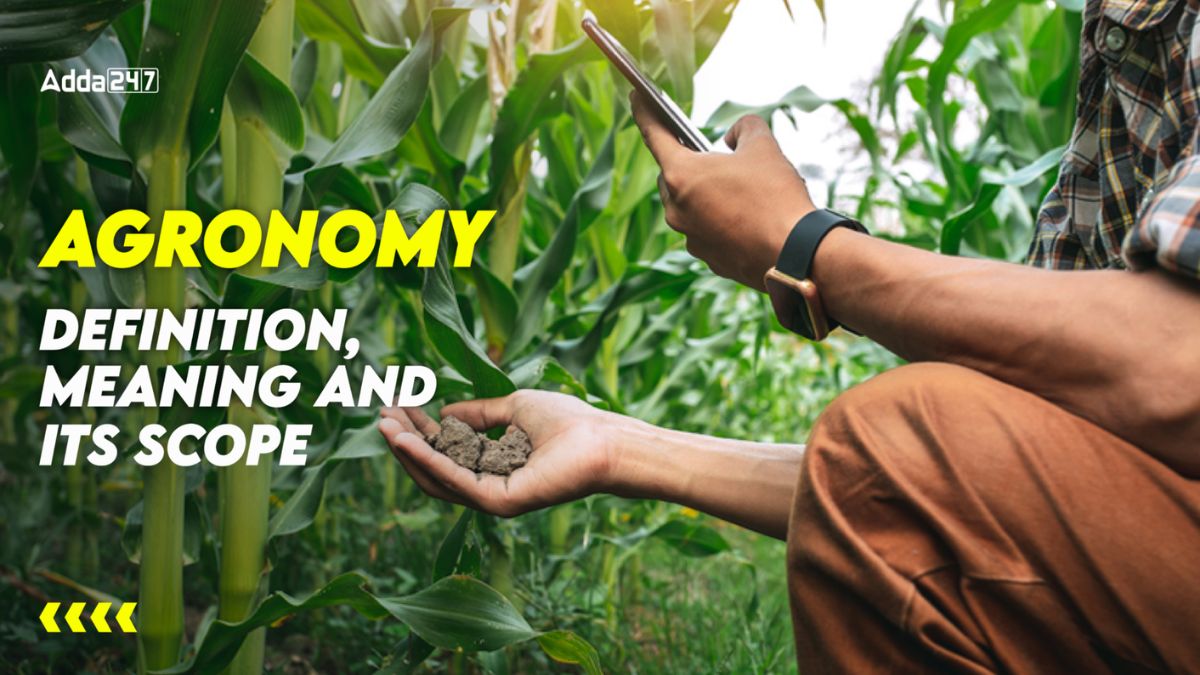Agronomy is a branch of agriculture focused on crop production and management. The term “agriculture” comes from the Latin words ‘ager’ or ‘agri,’ meaning ‘soil,’ and ‘culture,’ meaning ‘cultivation’. Agronomy encompasses both the science and art of farming, making it a broad and dynamic field. According to Norman (1980), agronomy involves the science of manipulating the crop environment with the dual goals of enhancing agricultural productivity and understanding the underlying processes.
Agronomy is the study of crop principles and practices, aiming to optimize crop growth and yields. This guide provides comprehensive information on agronomy, covering essential principles, practices, and advancements in the field.
What is Agronomy?
Agronomy is derived from two Greek words in which ”Agros” means field and ”Nomos” means management. Pietro de’Crescenzi is the father of agronomy. Agronomy has three branches namely,
- Crop Science,
- Soil Science, and
- Environmental Science deals only with applied aspects (i.e.,) Soil-Crop-Environmental relationships.
Agronomy looks at all the factors that influence how well crops grow. This includes the quality of the soil, the availability of water, the genetic traits of the crops, the climate, and how well crops adapt to it. It also covers the nutrients crops need, how they grow and develop, and the best ways to manage weeds. By considering these elements, agronomy aims to improve crop productivity and farming practices.
Agronomy is an art, science, and business.
- As an art, agronomy involves the practical skills needed to manage farm operations effectively. It’s about performing farming tasks well, even if one does not fully understand the scientific principles behind them. Both physical skills and mental expertise are crucial for successful crop production.
- As a science, agronomy uses scientific principles to produce high-quality crops. It relies on research and data to guide practices and improve yields.
- In terms of business, agronomy varies in approach. Small and marginal farmers often grow crops mainly for their own needs, while larger and more progressive farmers focus on maximizing both production and profit.
Agronomic practices are also influenced by non-biological factors such as financial constraints, consumer and farmer behavior, and environmental issues. The scientific study of agronomy focuses on how to profitably and efficiently grow crops while preserving natural resources and safeguarding the ecosystem.
Agronomy Boundaries
Agronomy covers various aspects of crop management and its scientific study, including physical, biological, and economic factors. It incorporates several disciplines such as ecology, entomology (the study of insects), climatology (the study of climate), soil science, plant science, and weed science. Effective agronomy relies on the integration and cooperation of these fields. Because scientific research is crucial to developing crop production techniques, these methods are continually evolving and improving.

Agronomy Scope
Agronomy is a constantly evolving field and plays a crucial role in various agricultural practices. Here’s how it impacts agriculture:
- Improved Agricultural Practices: By enhancing our understanding of plants and their environments, agronomy helps develop new methods to maximize crop productivity.
- Herbicide Use: The availability of herbicides has led to extensive knowledge about their application methods and selectivity, helping to effectively manage weeds.
- Irrigation Projects: Building large-scale irrigation systems aims to provide adequate water for crops, but successful implementation also requires effective water management techniques.
- Intensive Cropping: To meet the demands of a growing population, growing more crops on the same land has become common. Intensive cropping helps to maximize the use of available land.
- Energy Costs and Tillage: Rising energy costs have shifted focus from clean cultivation to various tillage methods. New technologies are continually developed to make farming practices more efficient.
- Addressing Agricultural Challenges: Agronomy also addresses issues such as soil fertility, low-yield crop varieties, poor agronomic practices, disease and pest control, and challenges related to production inputs and government policies. Research and extension programs play a vital role in overcoming these challenges.
Agronomy relation to other sciences
Agronomy is a multidisciplinary field that combines several areas of study to optimize crop production and management. Here’s how different disciplines contribute to agronomy:
- Soil Science: This discipline helps agronomists understand the physical, chemical, and biological properties of soil. By studying these properties, agronomists can modify the soil environment to improve crop growth and productivity.
- Agricultural Chemistry: This area focuses on the chemical composition and reactions involved in crop and livestock production. It helps agronomists understand how different chemicals affect crops and how to use them effectively for protection and growth.
- Crop Physiology: This field studies the life processes of crops, including how different parts of the plant function. Understanding crop physiology helps agronomists determine the specific needs of plants, such as nutrient requirements, to enhance their growth.
- Plant Ecology: Plant ecology examines the environment in which crops are grown, including factors like weather conditions (temperature, rainfall, etc.). This knowledge helps agronomists understand how environmental conditions influence crop development and yield.
- Biochemistry: This discipline explores the biochemical processes within crops. It provides insights into how biochemical reactions affect plant growth and development, helping agronomists identify critical factors that can enhance these processes
Who is an Agronomist?
An agronomist is a Scientist who studies the principles and practices of crop production and soil management for the production of food for human beings and feed for his animals.
Role of Agronomist
Agronomists play a key role in addressing crop production challenges and improving agricultural practices. Their responsibilities include:
- Addressing Various Problems: Agronomists tackle social, economic, and cultural issues related to farming, in addition to solving field-specific problems. Their goal is to ensure that farms operate efficiently and effectively.
- Applying Scientific Knowledge: They use knowledge from basic and applied sciences to enhance crop production. This involves applying research findings to practical farming techniques.
- Conducting Research: Agronomists research and develop methods for cultivating crops by considering factors such as soil quality, climate conditions, and crop varieties. They adjust production techniques based on these factors to optimize crop yields.
- Collaborating Across Disciplines: They work with experts from various agricultural disciplines to create effective cultivation methods and determine the specific nutrients crops need.
- Managing Weeds: Agronomists must choose the best weed management practices to prevent weed-related issues and protect crop health.
- Planning Crop Production: They are involved in planning crop sequences, determining the best times for planting and harvesting, and developing efficient harvesting methods.



 OPSC Assistant Agriculture Officer Salar...
OPSC Assistant Agriculture Officer Salar...
 ASRB NET Agricultural Extension Syllabus...
ASRB NET Agricultural Extension Syllabus...
 RSMSSB Agriculture Supervisor Recruitmen...
RSMSSB Agriculture Supervisor Recruitmen...




 Adda247 Job portal has complete information about all Sarkari Jobs and Naukri Alerts, its latest recruitment notifications, from all state and national level jobs and their updates.
Adda247 Job portal has complete information about all Sarkari Jobs and Naukri Alerts, its latest recruitment notifications, from all state and national level jobs and their updates.



